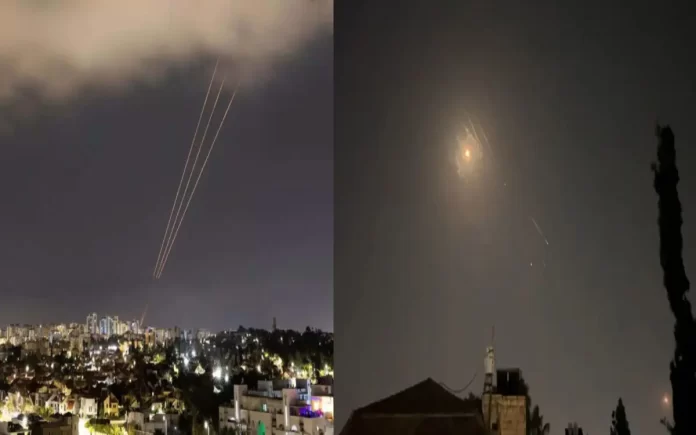Tel Aviv: According to an Israel military spokesperson on Sunday, Iran launched over 300 drones and missiles, with more than 99% of them intercepted. This unprecedented assault, consisting of hundreds of drones, ballistic missiles, and cruise missiles, escalated tensions in the Middle East and brought the region closer to a potential all-out war.
Rear Admiral Daniel Hagari hailed the outcome as a “very significant strategic success”, detailing Iran’s deployment of 170 drones, over 30 cruise missiles, and in excess of 120 ballistic missiles. While some ballistic missiles managed to breach Israeli territory, resulting in minor damage to an air base, the majority of intercepts occurred outside Israel’s borders.
This attack, occurring less than two weeks after a suspected Israeli strike in Syria that claimed the lives of two Iranian generals, marked the first direct military assault on Israel by Iran. It underscored decades of hostility between the two nations, rooted in Iran’s 1979 Islamic Revolution.
Also Read | France Assists Israel in Defense Against Iranian Attack, Israeli Military Reveals
President Joe Biden confirmed US assistance in intercepting “nearly all” of the incoming drones and missiles, pledging to convene allies for a unified response. International condemnation swiftly followed, with France, Britain, and Germany urging Iran to halt its actions to prevent further escalation.
Israel’s military highlighted the pivotal role of the Arrow system, designed to intercept ballistic missiles outside the atmosphere, in neutralizing most threats. Hagari reiterated Israel’s commitment to taking all necessary measures to ensure its security.
Tensions between Israel and Iran had been on the rise, particularly amid Israel’s six-month conflict with Hamas militants in Gaza. This conflict erupted following a cross-border attack by Hamas and Islamic Jihad, both backed by Iran, resulting in Israeli casualties and triggering hostilities. Subsequently, Hezbollah, an Iranian-backed group in Lebanon, launched attacks along Israel’s northern border, while Iranian-backed factions in Iraq, Syria, and Yemen targeted Israel with rockets and missiles.
In response to an April 1 airstrike in Syria, Iran, which had vowed revenge, acknowledged launching “dozens of drones and missiles” toward Israeli positions. The Revolutionary Guard cautioned the US against any involvement in actions detrimental to Iran’s interests.
The incident prompted Israel to implement precautionary measures, including activating air raid sirens and instructing residents to seek shelter. Israel’s Home Front Command suspended schools and restricted public gatherings, while several countries closed their airspace.
President Biden convened a National Security Council meeting in Washington to address the attack, and General Erik Kurilla of the US Central Command engaged with Israeli defense officials. Meanwhile, Iran’s mission to the United Nations issued a stern warning, cautioning against further Israeli aggression.
Also Read | Chinese Military Incursions: Taiwan Reports 16 PLA Aircraft in Its Airspace
Witnesses in Tehran observed lengthy queues at gas stations amid concerns about potential repercussions, while in Lebanon, Israeli airstrikes and shelling responded to the drone launch. Hezbollah claimed responsibility for firing rockets at an Israeli military site in the Golan Heights.
Explosions reverberated across various locations, including Amman in Jordan and Damascus in Syria, as Syrian air defenses endeavored to intercept Israeli interceptions of Iranian missiles.
The incident underscored the deepening tensions between Israel and Iran and the looming specter of further escalation in the volatile region.



